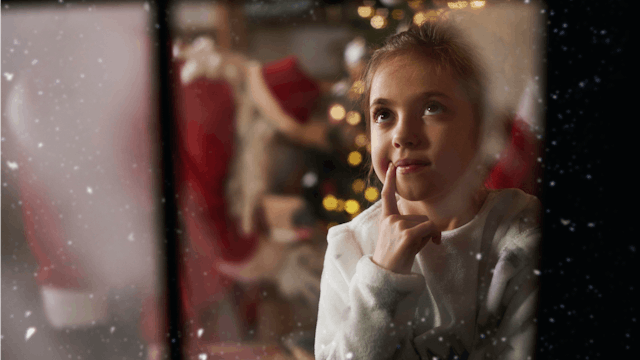What The Santa Claus Myth Gets Wrong About Christmas Magic

It all started with the Elf on the Shelf – that bothersome little imp. Our daughters named him Clumberbob, and, on top of him having exactly zero influence over our children’s good behavior, we forgot to move the little gremlin every second night. At first it was fun, everyone was excited to see where the little guy had re-situated each morning. We’d talk about his shenanigans with Santa, and wondered what kinds of snacks we should leave out for him the next night.
But soon enough, everything spiraled out of control. Eventually, citing the pint-sized Big Brother, Clumberbob, became our desperate last resort. We began hating ourselves more with each utterance of “Clumberbob is watching you!” or “I wonder if Santa will bring you any toys when you behave like that!”
It felt so underhanded trying to take advantage of our kids’ credulity – it was phony and irresponsible. Why were we resorting to tricking our kids into good behavior? Were we that feeble minded? Were they that feeble minded? Of course not. What were we even teaching them? It was a bad habit, and we knew it was working against us, but for some reason, the threats continued to pass through our lips. We also didn’t believe in bribing our kids, yet there we were. What was going on? The best part was, they saw straight through us anyways – they knew we were grasping at straws that didn’t even exist. Is there any better reality check than your kids outsmarting you?
Then, it became about some questions my 5-year-old asked me. In a single exchange, she managed to dismantle the myth of Santa Claus by pointing out one of the fundamental flaws grownups have been ignoring for generations. As my daughter and I packaged up some donations for Toy Mountain, she asked me, “Why don’t some kids get gifts?” I told her not everyone could afford gifts for their family, to which she inevitably replied, “But what about from Santa?” I told her sometimes Santa brings families things they need more than toys. Then, she went for the kill: “So does that mean they’re bad?”
In that moment, everything hit me – the lies, the deception, the inauthenticity of it all. The proverbial house of Christmas cards collapsed. Why, exactly, were we telling our kids they received gifts from Santa, but for some odd reason, the kids who needed Santa the most didn’t get anything from him? It made no sense. It also made me think about the floodgate of other questions she’d likely begin to ask me. Since the Christmas experience is different for every family, so is the Santa Claus experience – but why wouldn’t he be the same for everyone? Surely, she’d notice, and she’d begin to ask me about it.
I realized I had two options: I could continue to bluff my way through her questions, or, I could simply tell her truth. I decided to tell her the truth, and nothing has ever felt more right.
The whole interaction was a major light-bulb moment for me. I wondered how Christmas had become so concentrated on upholding the fantasy of Santa Claus. What purpose did that serve? How were our kids supposed to learn about the true magic of Christmas when we withheld the exact information that would better help them understand it? Why did my kids need to be a certain age to learn about reality, and the importance of generosity? Wouldn’t it serve everyone better to learn this from a young age?
There it was, and in that moment I realized: Christmas does not require Santa Claus to be magical. End of story. I decided my daughters would benefit so much more if they learned that not everyone is as lucky as we are – so as a family, we make it a priority to give back to other families, in as many ways as we’re able. There are some kids whose families can’t afford dinner, or presents, or any of the fun things associated with Christmas. But we can, and it’s our responsibility, as fellow human beings, to do something about it. Teaching my children about kindness, in as many forms as possible, is important to me. What better way to teach them this than through Christmas?
So, that was that. In one fell swoop, we came clean about Christmas. At first, it was confusing for my kids. They had a lot of questions. But it was surprisingly easier to tell them the truth instead of a knotted string of convoluted lies. Once they understood what we were saying, they moved on with their day like nothing had even happened. For those wondering if we destroyed the magic of Christmas for our little kids, I would maintain that we didn’t. I would argue we actually made Christmas more magical, because now, my kids were learning about the spirit of giving in a genuine way.
We also decided we wouldn’t take Santa Claus away from our kids, but rather, he would remain a pretend part of the fun. And, if other kids bring up the topic of Santa around my kids, which will undoubtedly happen, they know to say that Santa Claus is pretend in our house, and allow others to think what they want. Believe it or not, we didn’t ruin Christmas. My kids are as happy as they’ve ever been, and equally as excited about Christmas. They’re still misbehaving the same amount as before. However, now they’re more aware of the ways we’ve given back to other families, and they feel good about it. We’re confident we made the right decision.
Now, onto the next items to check off our list: The Easter Bunny and The Tooth Fairy.
This article was originally published on